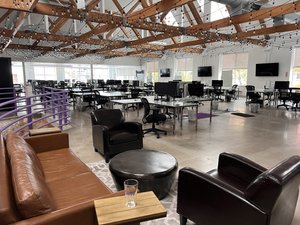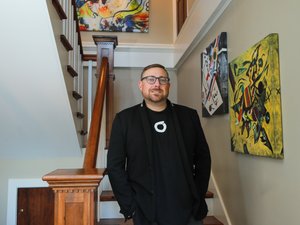Venture capital slowed dramatically and startups struggled nationwide throughout 2023 – epitomized in Columbus by the monumental collapse of Olive AI Inc.
But in this seemingly gloomy environment, entrepreneurs in Central Ohio continue to build.
Columbus Inno joins sister publications nationwide each year in recognizing local startups that have flown under the radar but we expect will make news in 2024.
Our Startups to Watch list for 2024 taps into rising trends such as helping athletes avoid injury, paying down student debt and rapid development in AI with its attendant risks.
And there’s one company that’s attempting a Phoenix-like rise from the stunning dissolution of a firm that had raised nearly $1 billion in VC and debt. Whether or not it works, it’s sure to be newsworthy.
AlignAI
Founders: Rehgan Avon, Brendan Kelly, Alexandra Hagmeyer (no longer with company)
Based: Columbus
Funding: Bootstrapped
After more than a year of turning consulting knowledge into a software platform that can grow more quickly, AlignAI launched its product to the first test customers in the fourth quarter.
Forty companies are on the waiting list, said co-founder and CEO Rehgan Avon.
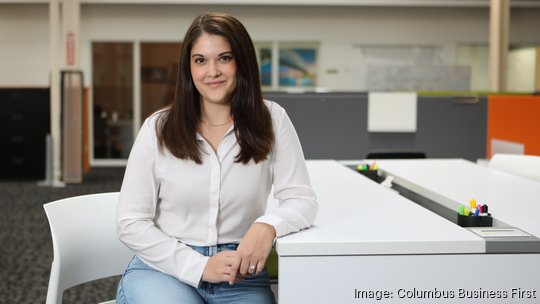
Rather than building artificial intelligence, the startup helps companies figure out how to best adopt AI to make use of their data while setting up guardrails for compliance and other risks.
The sudden evolution in 2023 of natural-language models such as ChatGPT – quickly followed by hand-wringing and regulatory response – coincided with and helped shape the emerging startup.
“The timing was so awesome,” Avon said. “We waited until that pivotal moment; we didn’t have to rebuild anything.
“There is more complexity involved in the way our customers are handling AI, because they’re leveraging these language models, which are much more complicated than what I call ‘vintage’ AI cases.’”
When Columbus Inno reached out to investors and others enmeshed in the Central Ohio startup community seeking recommendations for watchable startups, several named AlignAI.
As part of the pivot away from consulting, one of the three co-founders joined one of the first clients full-time (and still will be maid of honor at Avon’s wedding). Overall, the team shrank to about half a dozen during the product-building phase; now it will grow again, Avon said.
The company is aiming for software subscription revenue to hit an annualized rate of $1 million by year’s end. Customers are in the Fortune 1000, especially large enterprises subject to a lot of regulation.
“Our expertise is not that we know more than them,” Avon said. “We’re helping them manage the stuff they shouldn’t be spending their time on.”
A regulatory filing in spring under the business’ former name, Ikonos Analytics, indicated an open seed round seeking $1.5 million. Avon could not comment, which is typical during open rounds.
Currents
Founders: Craig Smith, Cole Smith
Based: Columbus
Funding: Bootstrapped
It all started, as these stories often do, with a spreadsheet.
Currents Systems Inc., now a mobile app, has grown to some 1,000 users by word of mouth.
CEO Craig Smith and CTO Cole Smith, who are brothers from the Chicago area, have been working on it as a side project for years.

In November, they went at it full time and moved the startup to Columbus.
“There’s just a lot of opportunity, so much momentum being built in Columbus,” Craig Smith said. “It seems like the natural fit.”
Currents replaces spreadsheets and a few heavily manual apps for keeping track of and managing ownership of possessions – cars, appliances, phones.
It stores warranties and receipts, helps shop for insurance and repair, relays recall alerts, tracks current resale value.
Revenue is expected to come from partnerships and referral commissions, such as one recently formed with a tech device reseller. Other opportunities could come from repair shops.
“There’s been a need for something like this to exist for some time,” Craig Smith said. “The success we’ll see in 2024 will be because many people have experienced some degrees of frustration or anxiety or pain owning their things, and are looking for some type of easier way to do it.”
Craig left consulting giant EY for the startup and plans to move from San Francisco. Previously, he worked for Aon and Workday.
Cole, a data scientist graduate of Ohio State University, worked for OSU spinoff Mobikit, then worked for the company that acquired it. Now, he wants to build something new.
Dolr
Founders: Naveed Iqbal, E.K. Dzotsi, Ashwin Acharya
Based: Columbus
Funding: $450,000
Student loan bills came due again in October after years of pandemic deferrals. Two of five borrowers still had not made their first payments by mid-November, according to the U.S. Department of Education.
The crisis represents an urgent mission – and potentially skyrocketing growth – for Columbus startup Dolr.
“We think that’s a fantastic way for us to get in there and really help these people find a path forward to zero student debt,” said co-founder and CEO Naveed Iqbal.
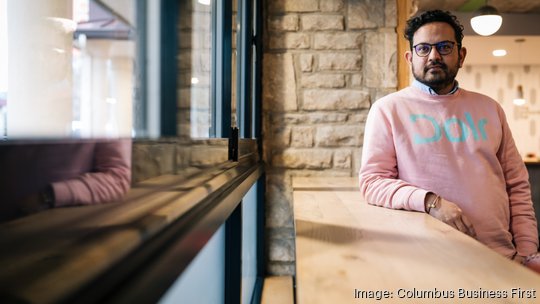
Dolr is a platform for employers to add loan repayment aid as a benefit, with a consumer-facing side that lets borrowers or their loved ones designate retailer rewards toward paying down debt.
Employers who demurred during deferrals now are calling to sign up, Iqbal said.
Revenue tripled in 2023 over 2022. This year, the goal is to grow revenue again by 20 times, expanding to hundreds of paying employers from 40, Iqbal said.
“That’s very realistic,” he said. “It’s going to be a pivotal year.”
Dolr, the DBA of Noether Rudin Inc., started mid-pandemic, during the pause on student loans.
A few employers added the benefit to build culture, knowing forbearance would end someday. That resulted in a steadier rollout and allowed for refining the platform, Iqbal said.
“We have never lost a customer,” he said.
Customers who were in place in 2022 spent 1.5 times as much on the platform in 2023.
The median employee benefit is $130 monthly; the highest is $437.50, the maximum for a federal tax deduction for employers, currently set to expire at the end of 2025.
Iqbal added his first full-time employee Jan. 1, a sales vice president to ramp up new accounts.
“I feel like 2024 will be a breakout year for Dolr,” Will Zell, serial entrepreneur whose Zell Capital (now named Vessel) was the first investor, said in an email.
“All of their customers love them.”
Ghostdog
Founders: Sean Lane, Carlton “Bubba” Fox
Based: Worthington
Funding: Unknown
A few months before the collapse of Olive AI Inc., which had raised nearly $1 billion in venture capital and debt, but returned nothing to investors, its founder had a new startup.
Sean Lane, seen in the photo, incorporated Ghostdog Inc. in Delaware in late July, and registered it in Ohio on Oct. 31, the same day the erstwhile unicorn announced it was selling off its remaining business lines and shutting down.
Ghostdog launched a YouTube channel of promotional videos in mid-November, including a depiction of how its “many powerful capabilities” could help different security agencies collaborate across several countries.
“We’re not the people on the front lines. ... We are their geek squad,” Lane wrote in a LinkedIn post introducing Ghostdog. “We are the ones that put everything we’ve got into building tools for them so they can do their jobs better.”
Lane has not responded to requests for comment.
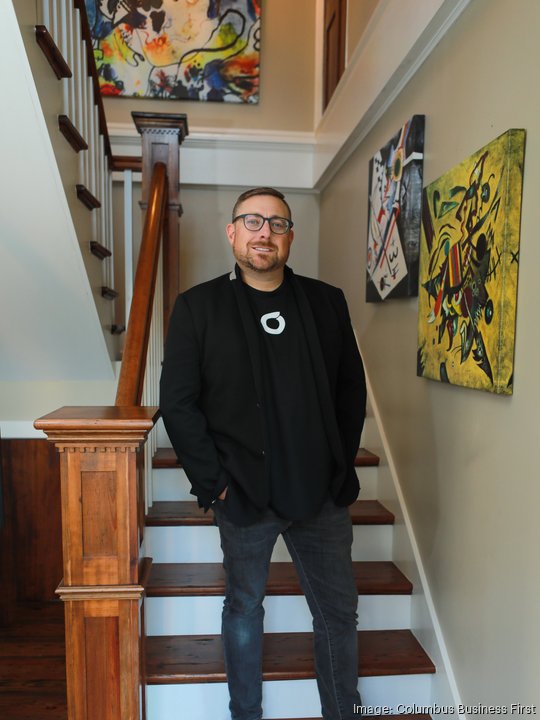
His co-founder is Carlton “Bubba” Fox, a former Olive COO who left in 2020.
Like Lane, Fox is a military intelligence veteran, according to the company’s first LinkedIn newsletter, which describes the startup as “the modern, mission browser for the classified web.”
Ghostdog aims to have a prototype ready for users early in 2024.
Early promo videos end with the sign-off: “Ghostdog out.”
The question is whether national security agencies grant the startup an in.
Layer
Founders: Jonah Katz, Andrew Hamilton
Based: Columbus
Funding: $3M seed round
Layer, which tames AI language models to build virtual personal assistants for software platforms used in business, rolled out with its paying first customers at year’s end.
About the same time, Microsoft Corp. released a slew of AI “copilots.”
Layer is building a whole new category, more unobtrusive than a chatbot or the copilots on the market, said co-founder and CEO Jonah Katz.
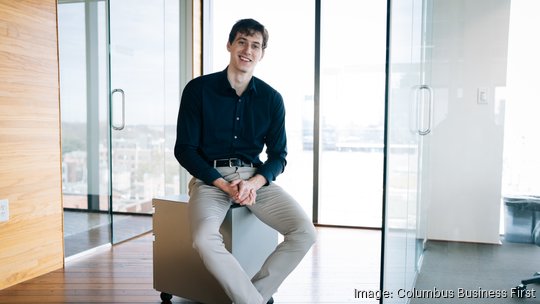
“We’re building something that will be pretty differentiated in the space,” Katz said.
Katz and co-founder and CTO Andrew Hamilton are taking it slow while developing a full, self-service version that won’t need as much work for onboarding clients.
The startup raised some $3 million last year led by Drive Capital. In the fall, the Cleveland natives moved the company to Columbus after founding it in New York City.
Working from Drive’s Short North office, they’re planning to hire more engineers in 2024.
Layer’s subscription software, unlike a chatbot, can create and execute commands on software platforms based on what the user types or says, such as, “Build a report of month-by-month sales and show deviations from last year.”
Hamilton developed a proprietary data structure that validates a workflow is safe before executing, shielding users from the mistakes and “hallucinations” that natural language AI can produce.
Layer also integrates into the regular workflow of a familiar platform such as ZoomInfo or Salesforce, instead of a separate box in a corner that requires duplicating commands.
“Our goal is to make other software products easier for people to use,” Katz said. “End users don’t want chatbots. It’s a disruption to the workflow.”
Skelo Wear
Founders: Kenny Anunike, Laila Anunike
Based: Columbus
Funding: Bootstrapped, $100,000 grant
Kenny Anunike had eight surgeries by age 26 – hands, knees, biceps, ankle – all from football injuries.
He jokes that the knuckle on his right ring finger is so swollen he could fit extra diamonds on his Super Bowl ring, which he earned playing for the Denver Broncos in 2016, although on injured reserve for the game.
Anunike, who grew up in Worthington, has been inventing and patenting protective gear since playing at Duke University a decade ago.
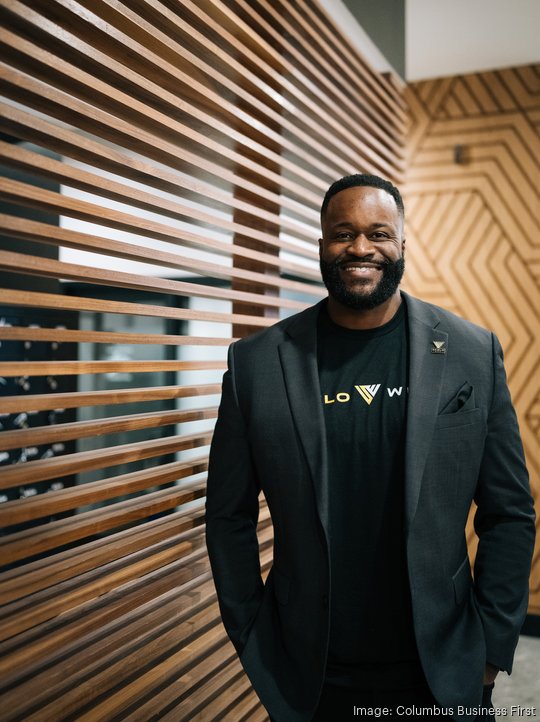
For 2024, he has teams from high schools through the NFL lined up for the first products to launch from his Columbus-based Skelo Wear LLC.
“We are introducing something totally new to the market,” Anunike said. “We aim to set the standard for this kind of protective equipment.
“The ultimate goal is to keep our players safe – enhance their safety, career longevity and quality of life after the game.”
Anunike and his wife, R&D Director Laila Anunike, started Skelo Wear in 2018 as a side project. At the time, he was a graduate assistant at Ohio State after injuries shortened his NFL career to three years.
Fordham University hired him as defensive line coach and there was talk that the school was prepping him for the head job. But after one year, the couple decided in the fall of 2021 that it was time to take the plunge and go full-time with the startup.
Skelo Wear received a $100,000 grant from Rev1 Ventures; otherwise the couple has largely self-funded it so far.
The grant helped the startup achieve key milestones last year, Rev1 said in a statement.
The first products are in the final stages of preparation and testing for full production by year’s end, Anunike said. Details are under wraps for now.
Skelo Wear plans a full line of protective gear and AI-powered training devices to enhance safety.
Already there are requests from other high-impact sports, construction work and activities prone to bone and joint injuries, Anunike said.
Cole Smith, co-founder of Currents Systems, worked previously for acquired Ohio State spinoff Mobikit. A previous version of this story named an incorrect OSU spinoff.
